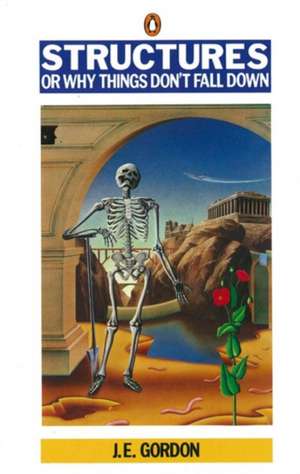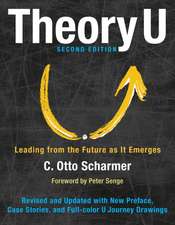Structures: Or Why Things Don't Fall Down
Autor J. E. Gordonen Limba Engleză Paperback – 25 sep 1991
| Toate formatele și edițiile | Preț | Express |
|---|---|---|
| Paperback (2) | 82.81 lei 3-5 săpt. | +12.69 lei 7-13 zile |
| Penguin Books – 25 sep 1991 | 82.81 lei 3-5 săpt. | +12.69 lei 7-13 zile |
| Hachette Book Group – 9 iul 2003 | 114.42 lei 3-5 săpt. |
Preț: 82.81 lei
Nou
Puncte Express: 124
Preț estimativ în valută:
15.85€ • 16.54$ • 13.11£
15.85€ • 16.54$ • 13.11£
Carte disponibilă
Livrare economică 14-28 martie
Livrare express 28 februarie-06 martie pentru 22.68 lei
Preluare comenzi: 021 569.72.76
Specificații
ISBN-13: 9780140136289
ISBN-10: 0140136282
Pagini: 400
Ilustrații: illustrations
Dimensiuni: 129 x 198 x 19 mm
Greutate: 0.31 kg
Editura: Penguin Books
Colecția Penguin
Locul publicării:London, United Kingdom
ISBN-10: 0140136282
Pagini: 400
Ilustrații: illustrations
Dimensiuni: 129 x 198 x 19 mm
Greutate: 0.31 kg
Editura: Penguin Books
Colecția Penguin
Locul publicării:London, United Kingdom
Notă biografică
James
Edward
Gordon
was
born
in
1913.
He
took
a
degree
in
naval
architecture
at
Glasgow
University
and
worked
in
wood
and
steel
shipyards,
intending
to
design
sailing
ships.
On
the
outbreak
of
the
Second
World
War
he
moved
to
the
Royal
Aircraft
Establishment
at
Farnborough,
where
he
worked
on
wooden
aircraft,
plastics
and
unorthodox
materials
of
all
kinds.
He
designed
the
sailing
rescue
dinghies
carried
at
one
time
by
most
bomber
aircraft.
He
later
became
head
of
the
plastic
structures
sections
at
Farnborough
and
developed
a
method
of
construction
in
reinforced
plastics
which
is
now
used
for
a
number
of
purpose
in
aircraft
and
rockets.
For several frustrating years he worked in industry on the strength of glass and the growth of strong 'whisker' crystals. In 1962 he returned to government service as superintendent of an experimental branch at Waltham Abbey concerned with research and development of entirely new structural materials, most of which were based on 'whiskers'. He was Industrial Fellow Commoner at Churchill College, Cambridge, and became Professor of Materials Technology at the University of Reading, where he was later Professor Emeritus. He was awarded the British Silver Medal of the Royal Aeronautical Society for work on aircraft plastics and also the Griffith Medal of the Materials Science Club for contributions to material science. His book, Structures or Why Things Don't Fall Down, is also published in Penguin.
Professor Gordon died in 1998. In its obituary The Times wrote of him that he was 'one of the founders of materials science' and that he wrote 'two books of outstanding literary quality ... at once entertaining and informative, providing absorbing interest for both expert and student'.
For several frustrating years he worked in industry on the strength of glass and the growth of strong 'whisker' crystals. In 1962 he returned to government service as superintendent of an experimental branch at Waltham Abbey concerned with research and development of entirely new structural materials, most of which were based on 'whiskers'. He was Industrial Fellow Commoner at Churchill College, Cambridge, and became Professor of Materials Technology at the University of Reading, where he was later Professor Emeritus. He was awarded the British Silver Medal of the Royal Aeronautical Society for work on aircraft plastics and also the Griffith Medal of the Materials Science Club for contributions to material science. His book, Structures or Why Things Don't Fall Down, is also published in Penguin.
Professor Gordon died in 1998. In its obituary The Times wrote of him that he was 'one of the founders of materials science' and that he wrote 'two books of outstanding literary quality ... at once entertaining and informative, providing absorbing interest for both expert and student'.

























